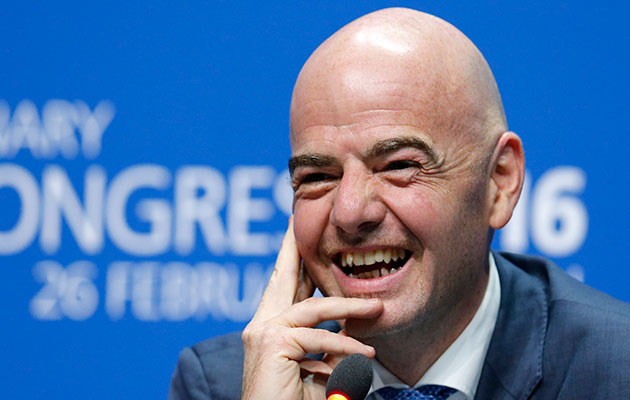Gianni Infantino will fulfil a pre-election promise this evening and play a football match on the pitch outside his new presidential office at FIFA headquarters in Zurich.
Before then the 45-year-old will have started work at familiarising himself with the finger-print security of his new working home, the rabbit-warren premises – including the onyx ‘contemplation room’ – and a staff uncertain about whether he may seek to employ his own preferences in key roles.
Infantino will also discover that he is to be paid significantly less than predecessor Sepp Blatter whom he replaced as president after a decisive second-round victory at Friday’s FIFA Congress in Zurich over Bahrain’s Sheikh Salman bin Ebrahim Al Khalifa.
Blatter, though precise figures will be published only shortly before May’s Mexico Congress, was thought to be paid around $6m.
Infantino’s new salary may be closer to the €3m he was thought to be receiving as general secretary of European federation UEFA.
Infantino’s appointment meant that Blatter will no longer be paid salary or pension contributions though he will ‘keep’ his FIFA Mercedes until after he has exhausted all legal options in seeking to overturn a six-year ethics ban for financial misconduct.
Indeed, Infantino will not be the highest-paid individual at ‘new FIFA’ after a wide-ranging package of reforms was also endorsed by the 209 member associations on Friday.
The new chief executive or secretary-general – the precise title has yet to be defined – will be the top earner. This reflects the governance changes which remove executive functions from the president and enthrones the new ceo as the most powerful man or woman in the world game.
Blatter, who was both president and chief executive, was paid a salary and bonuses, as was secretary-general Jerome Valcke before his sacking last month for playing fast and loose with the perks of the job.
Infantino will be paid a flat salary though the new ceo will receive both salary and bonuses.
For the time being German Markus Kattner will continue as interim secretary-general as well as being finance director.
He may remain in both functions for some time. Infantino could, in theory, force through his own personal choice for ceo within the next 60 days, before the reform changes take effect. But that would put him on collision course with the lawyers and corporate advisers playing a key role in pushing FIFA down a new structural role.
A standard corporate procedure of drawing up a target profile and then commissioning head-hunters to find the new ceo is then expected to be undertaken.
Infantino will have significant input, of course. During the presidency campaign he expressed a preference for choosing a non-European for the role as a gesture of reassurance to the world game that his appointment did not represent a UEFA takeover of the world federation.
However one of UEFA’s members on the FIFA executive committee tipped for promotion under Infantino is the former Manchester United chief executive David Gill who could become new finance committee chairman.
Infantino may also take a view about what the future may hold for several of his exco members – notably Angel Maria Villar (Spain) and Constant Omari (DR Congo) – who are notoriously media-averse in what is being ‘sold’ as a transparent new dawn for the world football federation.
The Swiss lawyer, who made a first official appearance at the formal opening of the FIFA Museum in Zurich yesterday, has insisted he wants to reunite football after the schisms inevitable in the lead up to the election.
He said: “We have to build bridges, not build walls. Football can certainly do that. I want to focus on football.
“We have had an election but not a war. It was a competition, but not a fight. It was a sporting contest. An election you win, you lose and then life goes on.
“Now we turn the page, we start to work, and I can show the whole world I’m not a candidate of Europe or wherever. I’m a candidate of football and football is universal.
“This is what we’ll start to do now in FIFA to work with everyone for the development of football and not to do politics, to speak about divisions, to speak about barriers.”







